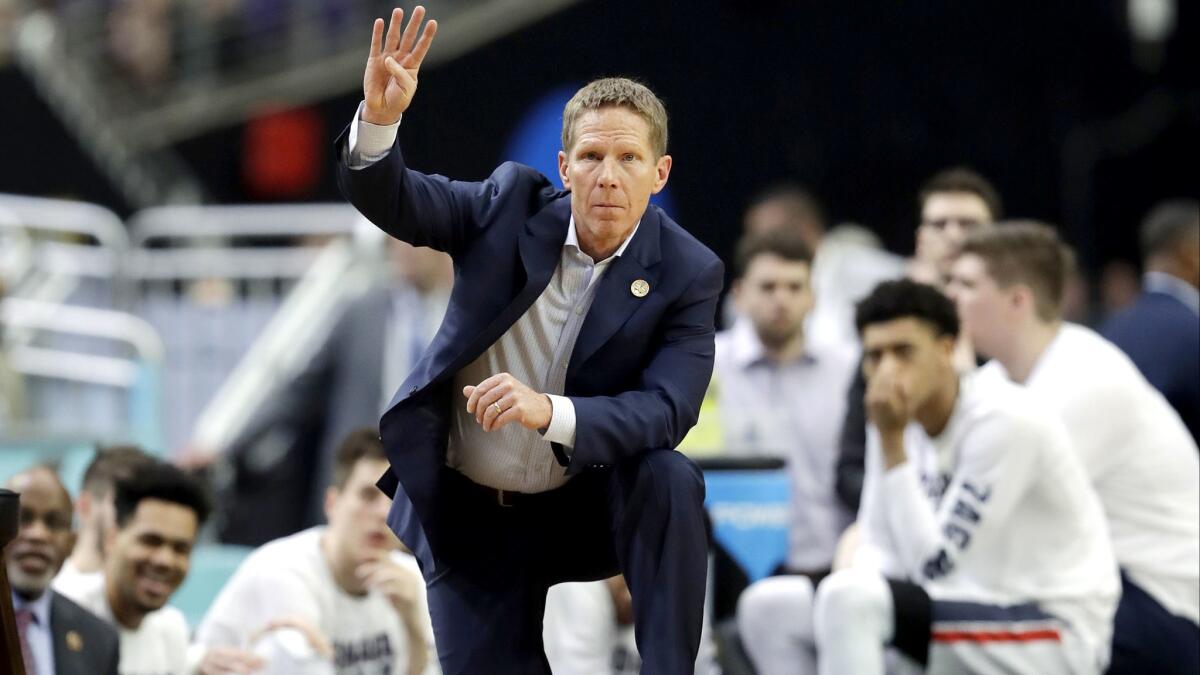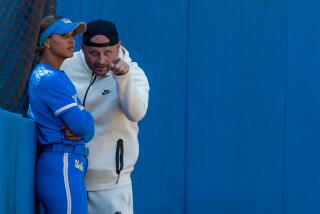For Gonzaga coach, sharing special moment with friends is only fitting

- Share via
Glendale, Ariz. — On the day after Gonzaga secured its first trip to the Final Four, Mark Few called the man who had started his epic coaching journey at the school.
Few wanted Dan Monson to be part of everything the Bulldogs did this weekend because in many ways the current Long Beach State coach already was, having hired Few as a graduate assistant in 1990 and guiding the school to its first NCAA tournament regional final in 1999.
Similar invitations were extended to Bill Grier, Leon Rice and Ray Giacoletti, the only assistants to work for Few in his 18 seasons as Gonzaga’s coach who have departed.
Come to Phoenix, they were told. Bring your families. Everything’s on us.
It was a gesture that illustrated how far the small Jesuit college had come in the years since Monson, Few and Grier once shared an apartment in Spokane, Wash., because their coaching salaries couldn’t support them having their own places.
When Gonzaga plays North Carolina on Monday night in the national championship game at University of Phoenix Stadium, Few’s former colleagues will sit together in prime seats watching their beloved school continue its stunning ascent on the court as well as in the resources department.
“If you could have seen it then to where it is now,” said Grier, who coached at Gonzaga from 1991-2007, “you would be in disbelief.”
When Grier first arrived, he recalled, the Bulldogs played in a high school-sized gym. Monson tried to lure Few, a former fellow camp counselor, with a salary of $500 a month because it was all the Bulldogs could offer. Few declined until Monson threw in free rent for a room in his apartment.
Grier moved in soon thereafter and occupancy expanded again a few years later when Few’s new wife, Marcy, took up residence because they could not afford anything better.
Together they enjoyed Gonzaga’s first basketball breakthrough, a so-called midmajor from the West Coast Conference hitting the big time with that trip to the regional final in Monson’s second year as head coach.
They would soon part ways. Monson headed to Minnesota after that season because of more than just the almighty dollar. Monson had witnessed similar pockets of success at other WCC schools, such as Loyola Marymount with Hank Gathers and Bo Kimble and Santa Clara with Steve Nash, and wondered whether it was sustainable.
Resources were also a factor, including Monson’s coaching salary.
“I was going to be able to make as much money in two years at Minnesota,” Monson said, “as it would have taken me 15 years at Gonzaga.”
Few succeeded Monson and never wavered in his belief that the Bulldogs could be much more than one-year wonders. They’ve been to the NCAA tournament every year since he became head coach, getting back to a regional final in 2015 and making four additional appearances in a regional semifinal.
Recalling their early days living together as brash twentysomethings, pushing each other on long runs and swims, Monson said Few was the only one who could have foreseen this kind of success for Gonzaga.
“He was the visionary,” Monson said. “He was the stubborn guy.”
Monson scrunched his face when asked about the oft-repeated criticism that the Bulldogs were all bark and no bite, compiling gaudy regular-season records only to fall short on basketball’s big stage.
“This is not a midmajor team right now that got hot and got to the final game,” Monson said. “This is a program that has incrementally gotten better to where now it’s one of the top two programs in the country.”
Monson harbored no regrets about having left for Minnesota and later Long Beach State, where he has spent the last 10 seasons, guiding the 49ers to the NCAA tournament in 2012. He said his departure forced the Gonzaga administration to realize that it needed to take its basketball program as seriously as its sociology department.
“When I left, they said, ‘OK, if we’re playing poker, let’s put all our money over here in this basketball thing and see if it can be our ticket,’ ” Monson said, “and certainly that’s paid off.’”
Few acknowledged his former colleagues as they watched his media conference Sunday from the back of an interview room. Their ties go deeper than just having just worked together. Few’s father, the Rev. Norm Few, officiated the weddings of Monson and Grier in addition to his own son’s.
“They are part of the guys that built this foundation to where it is,” Few said. “It never would have happened without them. I never would have been coaching without Dan Monson giving me a job and believing in me and letting me grow and doing all that.
“So I want them to feel like they’re a part of it because they are.”
Few did not schedule much downtime for his friends the last few days, inviting them to a reception and dismissing any concerns about the coaches’ children flitting about a banquet room as Gonzaga commenced its preparations for North Carolina at the team hotel.
“Mark’s like, ‘We’ve got 20 minutes until the players come. I want to visit with these guys,’ ” Monson said, referring to his former colleagues. “ ‘These [children] over here are fine.’ ”
Nearby, the Bulldogs assistants worried about the Tar Heels’ interior dominance. Few and his friends were otherwise occupied.
“We talked very little about North Carolina,” Monson said. “We were just sharing the moment.”
Twitter: @latbbolch
More to Read
Go beyond the scoreboard
Get the latest on L.A.'s teams in the daily Sports Report newsletter.
You may occasionally receive promotional content from the Los Angeles Times.











